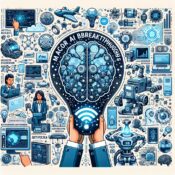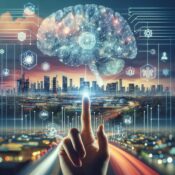In a recent Wall Street Journal article, the dynamics of artificial intelligence (AI) and its impact on various industries were thoroughly explored. The article delved into how AI technologies are being integrated into diverse sectors such as healthcare, finance, and manufacturing, significantly enhancing efficiency and innovation. A key highlight was the adoption of machine learning and natural language processing, driving forward advancements in predictive analytics and automation. Moreover, the article underscored the ethical considerations and challenges in AI development, including data privacy and the need for robust regulatory frameworks.
**Revolutionizing Industries: AI’s Role in 2023 and Beyond**
Artificial intelligence (AI) is no longer a futuristic concept; it’s a present-day reality reshaping how industries operate and innovate. As highlighted in a recent Wall Street Journal article, the integration of AI technologies is driving unprecedented changes across various sectors.
In healthcare, AI systems are revolutionizing diagnostic processes and patient care. Machine learning algorithms analyze vast datasets to predict disease outbreaks, personalize treatment plans, and even identify potential health risks before they manifest. This predictive power is not only enhancing patient outcomes but also streamlining operations within healthcare facilities.
The finance sector is also experiencing a seismic shift with AI. Financial institutions are leveraging AI for fraud detection, customer service automation, and risk management. Natural language processing (NLP) technologies are powering chatbots and virtual assistants, providing consumers with instant support and personalized advice. Meanwhile, AI-driven predictive analytics are aiding financial analysts in making more informed decisions, thereby optimizing investment strategies.
Manufacturing is another sector that AI is transforming. From predictive maintenance of machinery to optimizing supply chains, AI is enhancing productivity and reducing downtime. Machine learning models can forecast when equipment is likely to fail, allowing for preemptive maintenance that minimizes disruptions. Additionally, AI algorithms are optimizing logistics, ensuring that materials and products are delivered efficiently and cost-effectively.
Despite these advancements, the article emphasizes the importance of addressing ethical considerations and regulatory challenges. As AI systems become more integrated into daily operations, concerns around data privacy and security are growing. There’s a pressing need for robust regulatory frameworks to govern AI development and deployment, ensuring that technological progress does not compromise ethical standards.
In summary, AI is playing a crucial role in transforming industries by enhancing efficiency, innovation, and decision-making processes. As we move forward, balancing technological advancements with ethical considerations will be key to harnessing the full potential of AI. The future is undeniably AI-driven, and industries must adapt to stay ahead in this rapidly evolving landscape.






Recent Comments